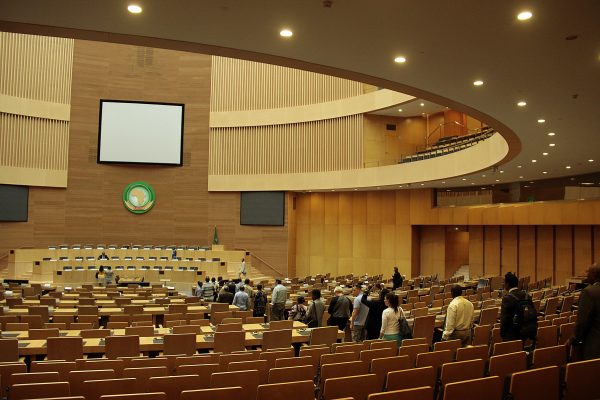English | Français | Português
It is a time of flux and uncertainty for the peace operations enterprise in Africa. With a rapidly evolving threat landscape, persistent armed violence, and growing political instability across many parts of the continent, the demand for collective responses to Africa’s security challenges is great. Paradoxically, and despite its proven utility as a tool to manage conflict, United Nations (UN) -sponsored peacekeeping has been on the decline, with no new major UN peacekeeping mission sponsored in close to a decade. In part, this is due to concerns about the effectiveness and loss of host country consent of U.N.-sponsored stabilization missions in Mali, the Central African Republic, and the Democratic Republic of Congo, which have captured the lion’s share of attention and resources in UN peacekeeping. But it is also due to factors such as a divided UN Security Council, deliberate attempts to undermine the credibility of UN peacekeeping through disinformation, and the changing nature of armed conflict, which has made political settlements with armed groups more elusive.
At the same time, regionally-sponsored peace operations by the African Union (AU), the Regional Economic Communities (RECs), and ad-hoc coalitions of countries have been on the rise. Over the past two decades, they have sponsored close to 38 peace operations in over two dozen countries, collectively involving hundreds of thousands of troops. African-led peace operations have unique comparative advantages in that they can deploy rapidly, have shown considerable strategic innovation and doctrinal flexibility, and can help localize ownership and management over conflict management outcomes. These contributions, along with the fact that African states contribute nearly half of all UN peacekeepers deployed worldwide, including two-thirds of female peacekeepers, means that the future of global peacekeeping very much depends on Africa.
 African-led peace operations have their challenges, including limited funding and expeditionary capabilities, a lack of civilian infrastructure and expertise, and insufficient backing to intervene in the continent’s most significant armed conflicts. With its robust civilian infrastructure and substantial expeditionary capabilities, UN peacekeeping in many respects complements African-led peace operations, which has facilitated a growing partnership between the UN and the AU. On December 21, 2023, this partnership culminated in the passage of UN Security Council Resolution 2719, which for the first time will allow UN-assessed contributions to support AU-led peace operations. UN-assessed contributions have the potential to enable greater African leadership, enhanced effectiveness and sustainability, and renewed political support for peace operations on the continent. But much depends on how this important resolution is implemented.
African-led peace operations have their challenges, including limited funding and expeditionary capabilities, a lack of civilian infrastructure and expertise, and insufficient backing to intervene in the continent’s most significant armed conflicts. With its robust civilian infrastructure and substantial expeditionary capabilities, UN peacekeeping in many respects complements African-led peace operations, which has facilitated a growing partnership between the UN and the AU. On December 21, 2023, this partnership culminated in the passage of UN Security Council Resolution 2719, which for the first time will allow UN-assessed contributions to support AU-led peace operations. UN-assessed contributions have the potential to enable greater African leadership, enhanced effectiveness and sustainability, and renewed political support for peace operations on the continent. But much depends on how this important resolution is implemented.
Africa Center faculty and alumni are helping key actors responsible for managing peace operations in Africa share experiences, expertise, and lessons learned with the aim of advancing and revitalizing peace operations in Africa at this critical time. From January 9-11, the Africa Center hosted the Force Commanders’ Roundtable, its first in-person peace operations program in over five years. Convening key officials from the United Nations, the U.S. Department of State, and the African Union, as well as 9 former force commanders from peace operations in Africa and other senior leaders, the Africa Center facilitated 3 days of discussions. Topics covered included how to harness the comparative advantages and improve coordination and cooperation between the key actors responsible for peace operations. This high-profile event would not have been possible without manifold contributions from Africa Center alumni, including UN Military Advisor Lieutenant General Birame Diop, State Department Global Peace Operations Initiative Division Chief Jennifer Pulliam, and former force commanders Major General Oumar Bikimo from Chad, Major General Diomède Ndegeya from Burundi, General (Ret.) Osman Nour Soubagle from Djibouti, and General (Ret.) Martin Luther Agwai from Nigeria. Other alumni, including the Head of the South African Development Community Mission in Mozambique Ambassador Professor Mpho Molomo, Brigadier General and Kenya Peace Operations Training Center Director Joyce Sitienei, Moroccan Defense Attaché to Ethiopia and the African Union Col. Khalid Bekri, Dr. Paul Williams, Professor in the Elliott School of International Affairs at the George Washington University, and Dr. Jide Okeke, Coordinator of UNDP’s Regional Programme for Africa, also contributed to the event.
One major takeaway from the roundtable is that not only do peace operations reduce conflict in the countries to which they are deployed, but they are also a valuable source of professionalism and expertise for deployed personnel, many of whom are Africa Center alumni. Through their contributions to peacekeeping, African countries have become ‘exporters’ of personnel, advice, cooperation, and assistance to conflict zones not just in Africa, but across world. The first of its kind UN-backed police mission in Haiti, which will be led by a contingent of 1,000 Kenyan police officers, provides one example of growing African leadership in global matters of collective defense, peace, and security.
The future of global peace operations looks increasingly African. The Africa Center looks forward to providing opportunities for its alumni to shape this future.

